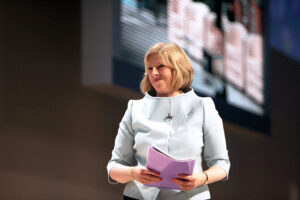Sarah Gordon argues in the Financial Times that Britain’s male politicians have failed to rise to the occasion and it is time to hand over to the women. Discipline and maturity may not be their exclusive preserve, she writes, but “the past few days could give one an excuse for believing so.”
There is something to be said for female power at a time when the men in her country’s ruling party appear to be living out their House of Cards fantasies.
Indeed, there is something to be said for female power across the Atlantic as well, where one party is in thrall to a caricature of an alpha male.
Right-wing psychodrama
Starting in the United Kingdom, Prime Minister David Cameron’s resignation after the EU referendum last week triggered something of a right-wing psychodrama there to replace him.
The number two of the “leave” campaign, Michael Gove, proverbially stabbed his champion, Boris Johnson, in the back, forcing the former mayor to bury his long-held prime ministerial ambitions. Angry voices suggested Cameron and his deputy, George Osborne, were behind Gove’s last-minute candidacy in order to punish Johnson for leading Britain out of the European Union.
On the left, the opposition Labour Party chose this moment to attempt to dethrone its ineffectual leader, Jeremy Corbyn. (Two of whose likely successors, Yvette Cooper and Angela Eagle, are women too.)
At the very moment “Brexit” plunged the United Kingdom in uncertainty, the men of Westminster succumbed to petty rivalries.
The governor of the Bank of England, Mark Carney, did his best to inspire confidence. But the Canadian-born non-politician was overshadowed by two women who could soon rule the still-United Kingdom: Nicola Sturgeon, the first minister of Scotland, and Theresa May, the unpretentious home secretary and Cameron’s likeliest successor.
Scotland stays the course
Sturgeon wasted no time trying to secure Scotland’s place in the EU, given that the region voted so overwhelmingly to stay in the bloc. She flew to Brussels for talks with leaders there and reached out to her counterparts in Gibraltar and Northern Ireland, two other parts of the United Kingdom which voted to remain.
But Sturgeon also urged calm. A second independence referendum is now likely, she said, but it wouldn’t be called for another couple of years. She assured EU nationals living and working in Scotland that they were welcome and censured the leave campaign for stirring isolationism and xenophobia. Scotland, she maintained, is a “modern, outward-looking and inclusive country.”
No discussion of women in Scottish politics would be complete without mentioning the formidable Ruth Davidson, the leader of the Scottish Conservative Party. Had the remain campaign hinged entirely on her powers of persuasion, Britain wouldn’t be in the situation it’s in today.
“Just get on with the job”
Like Sturgeon, May counseled patience.
Article 50 of the EU treaty, which allows for a member state to leave, wouldn’t be triggered for several more months, she said.
Nor would her government overreact and pass an emergency budget with additional spending cuts and tax increases to cope with the deteriorating fiscal situation, as George Osborne had suggested before the referendum.
May lashed out at those who seem to think politics is a “game”. Not everyone in Westminster understands what life is like for ordinary people and how the decisions that are made there affect them, she said.
If you’re from an ordinary working-class family, life is just much harder than many people in politics realize. You have a job, but you don’t always have job security. You have your own home, but you worry about mortgage rates going up. You can just about manage, but you worry about the cost of living and the quality of the local school.
She understands. Unlike the Tory boys club, May did not grow up wealthy nor did her path to power run through family connections and the Conservative Research Department. “I just get on with the job in front of me,” she said.
Ruler of a continent
When it became clear on Friday morning Britain had voted to leave the EU, some of the bloc’s leaders let their pique get the better of them.
Jean-Claude Juncker, the president of the European Commission, urged Britain to make haste and mocked its representatives in the European Parliament, asking why they were still there.
Jean-Marc Ayrault, the French foreign minister, argued it would be disrespectful to the remaining 27 member states for Britain to delay the divorce proceeding.
His German counterpart, Frank-Walter Steinmeier, agreed. Britain should trigger Article 50 as soon as possible, he said, “so we don’t end up in an extended limbo period.”
But Steinmeier’s boss took a step back. “It should not take ages,” Angela Merkel, the German chancellor, said, “but I would not fight now for a short timeframe.”
She called for “businesslike” negotiations but also set out her terms: there can be no single-market access if Britain does not accept the free movement of people.
Merkel said as much before the referendum and she’s not backing down. Doing so might inspire others to leave as well and then “cherry-pick” the conditions of their associate membership. Merkel’s priority, as always, is to keep the show on the road.
Her leadership through the various European crises of the last few years has not been without controversy. The Greeks and the Italians say she’s been too harsh on debtor states; her right-wing allies at home and abroad say she’s been too forgiving. Her Bavarian sister party is up in arms about her open-door immigration policy; the left complains now that she’s backpedaling.
But Merkel never panics, nor does she stubbornly persist when popular approval doesn’t catch up fast enough. She adjusts and makes concessions, as long as things keep moving broadly in the same direction. She is the undisputed master of German politics and the unofficial ruler of a continent. The fact that this perturbs so few is a huge and underrated accomplishment.
Safe pair of hands
Britain’s EU referendum divided politics in America as well.
When asked, Donald Trump, the Republican presidential candidate, endorsed an exit — off the cuff and without thinking through the consequences, as he is prone to do.
Hillary Clinton, by contrast, cautioned against leaving, placing the EU in the context of transatlantic relations and the American-led liberal world order on which so much of our shared prosperity and security is built.
Clinton is no Merkel but she is a paragon of moderation and stability compared to Trump.
Whereas the property tycoon has exploited all the right’s worst instincts, the former secretary of state and first lady admonishes the left to prioritize governing over ideological purity.
While Trump deliberately widens splits between ethnicities, genders and parties, Clinton argues that America is “stronger together”.
And at a time when mistrust in the political establishment has hit rock bottom, Clinton’s challenge is rehabilitating compromise, pragmatism and quid pro quo.
There is no guarantee she will succeed.
Nor are any of the women featured here without flaws.
Sturgeon’s education and health policies are statist and failing. May’s no-nonsense determination sometimes means she bulldozes over reasonable criticism. Merkel’s incrementalism can morph into indecisiveness. And Clinton wants power too badly.
But when the alternative is grown men acting like school boys and a seventy year-old bully using national politics to repair his own fragile self-esteem, there is no doubt these women would each do a superior job.




